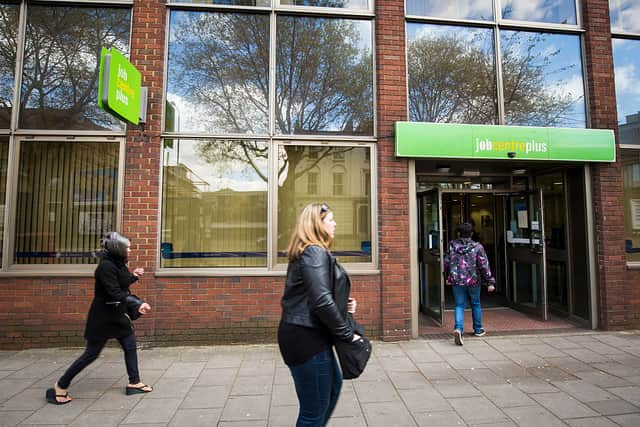DWP strike 2022: when are Christmas strikes, why are staff walking out, will dates affect benefits payments?
and live on Freeview channel 276
Staff working at the Department for Work and Pensions (DWP) are set to walk out on strike for two weeks over Christmas.
More than 200 members of the Public and Commercial Services (PCS) union are expected to take part in the industrial action, including staff in three DWP offices in Liverpool and one in Doncaster.
Advertisement
Hide AdAdvertisement
Hide AdThe walkout is part of the union’s national campaign for a 10% pay rise, job security and no cuts to redundancy terms. PCS general secretary Mark Serwotka said: “Our members have been plunged into ever-increasing depths of poverty.
“They shouldn’t have to rely on foodbanks to feed their children or be forced to make the choice of either working from home because the journey into work is too expensive or working in the cold under blankets because the cost of heating is too expensive.
“It’s a disgrace that our members in the DWP – the government’s own employees – are claiming the benefits they pay out to others. The government is in the position to stop these strikes by putting money on the table, and we call on them to do so.”


What dates will DWP strike?
The strike will start on Monday 19 December and will continue until Saturday 31 December, covering nine days in total, the PCS has confirmed. The union added that other targeted action at the DWP is likely to follow as part of its campaign for better pay.
Advertisement
Hide AdAdvertisement
Hide AdThe PCS has previously served notice of a month of strike action across 250 sites of the Driver and Vehicle Standards Agency and the Rural Payments Agency and 12 days of rolling strike action at the National Highways over Christmas and the New Year.
The union will be announcing strike dates in other departments, including the Home Office, over the next few weeks.
Will the strikes affect benefits payments over Christmas?
The strike is not expected to disrupt any benefits payments over the Christmas period as these are issued automatically, according to the DWP.
A spokesman for the department said: “We greatly value the work of our staff but the PCS Union’s demands would cost the country an unaffordable £2.4 billion when the focus must be on bringing down inflation to ease the burden on households, protect the vulnerable and rebuild our economy.
Advertisement
Hide AdAdvertisement
Hide Ad“Benefits, the state pension and child maintenance payments are paid automatically and people who rely on that support will continue to receive it.”
Benefits are set to be paid early for some claimants this month due to upcoming bank holidays, including Monday 26 December and Tuesday 27 December - the latter being a replacement bank holiday for Christmas day which falls on a Sunday this year.
It means that payments set to arrive on 24, 25, 26 or 27 of the month will instead be paid on Friday 23 December. If you get your payment on the second of the month, the one due to go into your account on 2 January 2023 should instead appear on Friday 30 December 2022.
For those who receive a form of benefit that is paid out fortnightly - including Employment and Support Allowance (ESA), Income Support and Jobseeker’s Allowance - if your payment date is going to fall on any of the bank holidays, you will instead receive it on the last working day beforehand.
Anyone who is paid their benefits on a different date from those listed above can expect their money to arrive on the same day as usual.
Comment Guidelines
National World encourages reader discussion on our stories. User feedback, insights and back-and-forth exchanges add a rich layer of context to reporting. Please review our Community Guidelines before commenting.
